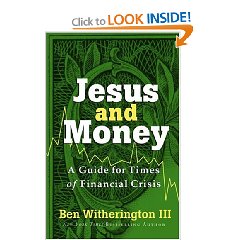http://www.brazospress.com/Book.asp?isbn=978-1-58743-274-3
Discretionary spending. Its an odd phrase. It suggests a person who has more money than they really know what to do with. But in fact most of the people who are reading this do have at least some discretionary funds. So here is where I say that this money should be in a separate budget column or category from the bills you must pay each month. Every Christian needs to evaluate his or her budget and especially look closely at what they are doing with ‘discretionary spending’.
This ought to be
obvious, but I can tell you that some people are dumb-founded when they
discover how much of their surplus money they are simply wasting and not
putting to good use. One of the real
problems in living in a culture like ours is that there are so many stimuli urging
you to spend that you can even get to the point of feeling you must do so, even when you don’t need the product at all.
I’ve even met Christians who think
it is their patriotic duty to buy American ‘stuff’ even if it’s pure junk, and
not even close to a necessity of life. One
thing you can and certainly should do to simplify your lifestyle is to make
sure you are on the ‘no call’ list for solicitors of various sorts. And another
thing–don’t make any financial commitments to such persons over the phone. Never!
And please don’t tell me you don’t have a budget. Ann and I have tried that strategy and I can tell you its an excellent strategy if you want to fail to have any money to save or give.
What do I do with my discretionary spending? Well I have several categories of things I put in there: 1) movies; 2) books; 3) CDs; 4) concerts; 5) non-business travel (e.g. vacations). Books actually are a part of my work, my job. As a research professor I spend a lot of time researching and writing. And I have gotten to the point where as Mr. Wesley recommend its time to do some divesting as I have a lot of books. So I am selling them to a theological library that needs them. This frees me up from an enormous amount of weight and space eating objects in my home and office. It also provides me with a little money to save or invest for our future or for using to support various ministries. In general I have about a $700 a year budget for books, CDs, concerts and I try to stick to it.
Vacation is another matter . It’s really a separate category. Much of the time Ann and I combine business with pleasure. Last summer I was asked to come and lecture in New Zealand, so since we have never been there we scheduled extra time for sightseeing. Had we tried to go to New Zealand purely for pleasure it would have cost thousands of dollars, even just for the plane tickets. Next summer I must lecture in six Australian cities. I hope to spend some time on the set of the Voyage of the Dawn Treader as well. You get the picture. Normally we will simply take a week or so during the summer and visit my mother in Wilmington and go to the beach. Beach vacation on the cheap, and family time to boot. This is a more normal summer vacation for us.
Discretionary spending however is an ever shifting category. For my wife and I it will change in a big way in less than two years— we will have finished paying for our house ten years early and the cars will be all paid off as well. Then we will have to do a serious revamping of what to do with discretionary spending. The goal here is not mere financial independence. The goal is to find a way to free up more money for investing in various ministries and good causes, all the while simplifying our livestyles as we head towards the finish line. The goal here is to follow Biblical models of living and spending making us more useful for kingdom work.


